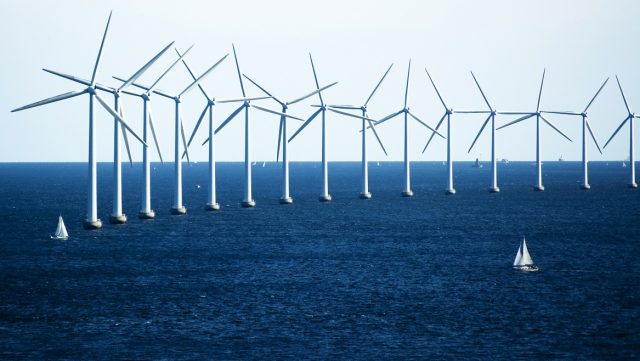FOR IMMEDIATE RELEASE
Date Published: Tuesday, January 11, 2022
Washington, D.C. Tuesday, January 11, 2022 — On Friday, January 7, 2022, Responsible Offshore Development Alliance (RODA), along with many other commercial fishing associations and businesses across the country issued recommendations to the Bureau of Ocean Energy Management (BOEM) for reducing impacts from offshore wind energy development to fishing, coastal communities, and sustainable domestic seafood production.
Guidelines alone cannot achieve strong oversight
Strong mitigation requirements must be standardized to protect marine resources and existing uses of the Outer Continental Shelf. The most important step for BOEM to take immediately is to implement effective processes to mitigate fisheries impacts during offshore wind planning and project design. These must be supported by regulations and strong federal oversight, rather than deferring to developers’ voluntary measures to accommodate fishing safety and resiliency.
| “BOEM is charged with regulating offshore energy developers, not advising them,” said Patrice McCarron, Executive Director of the Maine Lobstermen’s Association.
Scot Mackey, Executive Director of New Jersey’s Garden State Seafood Association said “BOEM must develop mitigation requirements and not just guidance. There needs to be more accountability in the BOEM process.” “The burden of proof must shift to the developers to prove they are not causing unmitigable harm before development is allowed to proceed. We are not the ones applying for permits and leasing offshore areas, as such, the burden of proof should not lie with us,” stated Leigh Habegger, Executive Director of the Seafood Harvesters of America based in Washington D.C. |
Mitigation must follow a step-wise approach
The “mitigation hierarchy” outlined by the National Environmental Policy Act requires an agency to evaluate whether a project has taken effective actions to, in sequential order, avoid, minimize, mitigate, and compensate for impacts. Fishing industry groups urged BOEM to prioritize immediate action on the first step, avoidance, including developing measurable criteria to site offshore wind infrastructure off of fishing grounds.
| “If BOEM were to carry out its process properly and in such a way that it prevented interference with commercial fisheries, there would be no need for ‘mitigation and compensation,’ which is associated with harm and a failure to prevent interference with reasonable uses,” said Meghan Lapp, Fisheries Liaison of Seafreeze Shoreside and Seafreeze Ltd. in Narragansett, Rhode Island.
Mike Conroy, Executive Director of the Pacific Coast Federation of Fishing Associations in San Francisco, said “we view mitigation to be hierarchical in nature. The resulting guidance should include clearly defined and measurable benchmarks so that the public can have confidence in the process.” “The fishing industry is expected to bear both the brunt of the impacts and the burden of proof of those impacts. We need our state and federal legislators to step up and stand with us to make sure that a fair, inclusive, and binding process is put in place to ensure America’s food producers and food security are prioritized,” said Joe Gilbert, owner of Empire Fisheries in Stonington, Connecticut. |
Constructive processes are needed for science and governance
The fishing industry repeated long-standing calls for BOEM to implement reasonable processes for fisheries mitigation that are equitable, transparent, inclusive, and intelligible. Best science and management outcomes are achieved with direct involvement of impacted communities and deliberate inclusion of their local knowledge, particularly on topics related to socioeconomics.
Regulations for fisheries are extensive, strict, and follow national standards that integrate regional needs and expertise through fishery management councils. BOEM’s approaches to mitigation must be national in scope, with appropriate regional variances similar to those that have maintained and rebuilt sustainable domestic fisheries. There is much concern that BOEM’s process to date incorporates fishing expertise only through “notice and comment” processes, which are inconsistent with best practices in natural resource management.
| “Our proud American fishermen and processors and their families have worked hard and invested in our Nation. They have helped build the most sustainable and best managed fisheries in the world,” said Mike Okoniewski, Secretary of the West Coast Pelagic Conservation Group based in Westport, Washington.
“Commercial fishermen should be considered partners and be meaningfully engaged throughout the process with a reasonable expectation of informing the result,” stated Eric Brazer, Deputy Director of the Gulf of Mexico Reef Fish Shareholders’ Alliance headquartered in Galveston, Texas. “A single meeting with an entire coast comprising diverse fishing sectors, communities, gear types, and businesses is not an inclusive or participatory process and does not provide adequate due process,” said Virginia Olsen, Executive Liaison of the Maine Lobstering Union. |
Mitigation must be designed to address cumulative impacts
Cumulative impacts of multiple offshore wind projects across a region will produce more severe impacts to biological resources, fishing, and supporting communities than merely the additive effects of single projects. BOEM’s absence of a programmatic approach to offshore wind planning has resulted in excessive demands for meetings and public comments, but little actual understanding of the environmental and socioeconomic effects of large scale offshore wind development. Improving understanding of cumulative effects is prerequisite to their mitigation.
| “Adequate guidelines would recognize that the impacts of OSW development on fishing appropriately extend beyond the footprint of any individual project site. The Outer Continental Shelf Lands Act does not limit BOEM’s obligation to implement mitigation strategies to the footprint of any individual project,” said David Frulla, Counsel for the Fisheries Survival Fund, which represents Atlantic scallop fishermen from Maine to North Carolina.
“The fishing industry has consistently asked for a comprehensive analysis of environmental and biological impacts, and other issues, for the entire wind energy area. This area must be monitored and analyzed as a whole to truly understand the impact to the area,” said Katie Almeida, Senior Representative of Government Relations & Sustainability for the Town Dock in Point Judith, Rhode Island. “Mitigation must take into account the full extent of impacts to a renewable food source for Americans. Wild caught seafood is known to have one of the smallest carbon footprints in food production, requiring no inputs to produce such as feed, fertilizers, antibiotics, arable land or large amounts of fresh water. This protein resource cannot be protected without a cumulative approach,” said Yelena Nowak, Executive Director of the Oregon Trawl Commission. |
Standardized compensation strategies must be equitable and based in science
Financial compensation is a key part of impact mitigation, but industry members continue to recommend that it should only be the final step of the process after all possible actions have been taken to avoid and minimize risk. Fishing organizations are concerned that BOEM’s process to develop guidelines for impact fees can only result in voluntary, developer-administered funding which will not produce fair results, nor be configurable to address cumulative effects.
In December 2021, RODA released a report assembling the expertise of a large national cross section of fishing industry members on effective guidelines, best practices, and principles regarding compensatory impact fees for the entire seafood industry, from crew members to vessels and shoreside businesses. Without a trusted, participatory process to determine when and how compensation will reduce impacts, the future of our fishing communities will be at serious risk.
It will take some time to develop impact fee determinations that are justified in science and equity. If existing offshore wind projects undergo final review before those are implemented, as an interim-only measure BOEM should require a reasonably-calculated set-aside for each year of operation while administrative mechanisms are developed. While payouts can offset some monetary impacts of offshore wind, achieving the goal of long term seafood sustainability would require those impacts to be avoided through collaborative planning and rigorous oversight.
| Lane Johnston, Programs Manager of RODA said, “OSW developers must not be responsible for directly administering funds. Furthermore, calculations must be scientific and economically based and any framework must be co-designed with impacted parties.” |
###
About Responsible Offshore Development Alliance
Responsible Offshore Development Alliance (RODA) is a broad membership-based coalition of fishing industry associations and fishing companies — across the United States — committed to improving the compatibility of new offshore development with their businesses. The alliance works to directly collaborate with relevant regulatory agencies, scientists, and others to coordinate science and policy approaches to managing development of the Outer Continental Shelf in a way that minimizes conflicts with existing traditional and historical fishing.
Connect with RODA on Twitter, Facebook, and Instagram.








